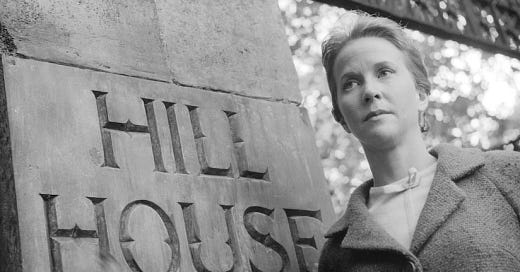When I first posted this little party piece about the first paragraph of Shirley Jackson’s The Haunting of Hill House, going on a decade ago, I made a sloppy error of transcription that somehow went undetected by me or anyone else until sometime late last year, when a friend (no, really, someone who likes me and whom I [still] like) pointed it out to me. Unfortunately and/or comically, I couldn’t find anyone who could access and repair the text as it had long lived online, but it just occurred to me today that I could simply rebuild the entire thing here.
(And I’ll fess up to the mistake below.)
Without further ado, a little explication de texte for y’all.
No live organism can continue for long to exist sanely under conditions of absolute reality;1 even larks and katydids2 are supposed, by some, to dream. Hill House, not sane,3 stood by itself against its hills,4 holding darkness within; it had stood so for eighty years and might stand for eighty more. Within, walls continued upright, bricks met neatly, floors were firm, and doors were sensibly shut; silence lay steadily5 against the wood and stone of Hill House, and whatever walked there,6 walked alone.
First, let’s hear it for that semicolon, the first of three in this paragraph. Any number of celebrated writers who ought to know better—I’ll name no names—have said any number of foolish, disparaging things about semicolons. Jackson uses them, beautifully, to hold her sentences tightly together. Commas, semicolons, periods: This is how prose breathes.
I wonder how many combinations of fauna Jackson experimented with before she selected “larks and katydids.” The two k’s are a particularly nice touch. You are reading this paragraph aloud, are you not? You ought.
[2024 update: Thanks to Jackson’s dazzling biographer Ruth Franklin, I now know that though the larks were always in place, Jackson toyed with grasshoppers, dragonflies, and butterflies before she landed on katydids. The doubling of the k sound is, I think, a coup, and it’s a wonderful demonstration of the acuteness of SJ’s ear. It’s also, by the way, a known thing that the novel’s heroine was originally called Erica—another k sound. Eleanor—which makes a softer, more timid noise—is much better, I think.]
I love the contrast of the deferential “by some” and the blunt “not sane.” The paragraph marches along in stately fashion, but Jackson’s beginning to tilt you off-balance. Hold on.
And this is where I messed up. I’d copied out the paragraph with my own clumsy digits, and in the retyping I’d altered “its hills” to “the hills.” And then I added insult to injury by suggesting that the echo of “Hill House” to “the hills” didn’t “sing to me.” (Yikes.) Well, if Jackson had indeed written “the hills,” sure, I still think, I might have had a point. (Though I might not.) But that’s not what she wrote, and the echo of “Hill House” to “its hills” sings to me like Maria Callas. (Don’t necessarily ask me why; it just does.) OK, back to our regularly scheduled program.
SJ is marvelous with adverbs, don’t you think? (Don’t let anyone poison your mind against adverbs. Adverbs are great. They’re almost as great as semicolons.) “Neatly,” “sensibly,” “steadily”: It’s all so civil and civilized. Until…
This may well be my favorite comma in all of literature. It’s not grammatically necessary; you might, if you were so inclined (I’m not), argue that it’s incorrect. But here it is, the final breath suspension of the paragraph, and I like to think that it’s SJ’s way of saying, “This is your last chance to set this book down and go do something else, like trowel around in your flower beds or stroll to the corner store for an ice cream cone. Because from this point on it’s just you, and me, and whatever it is that walks, and walks alone, in Hill House.”
I don’t think that anyone’s going anywhere. Right?
[2024 update #2: At some point since this piece was first published, Ruth Franklin was also kind enough to confirm for me that throughout the drafts and revisions of Hill House, the Comma of Doom was there from the very beginning. Though I’d have been flabbergasted had it made its way into the paragraph by any other means than Jackson’s own hand—it’s the sort of thing a copy editor might delete but would never add—I was grateful, given how much I talk about that comma, to have its origin confirmed.]




I left Twitter in a huff when Elon took the helm and I've just landed here. Poking around, looking for "my people," I found you again. I hadn't realized how much I missed your cleverness. You are a breath of fresh air! Truth: I was afraid to comment, lest I made a mistake in grammar or punctuation. Then I said fuck it, and here we are. You are endlessly entertaining. Thank you for that.
"Comma of Doom." I love it.